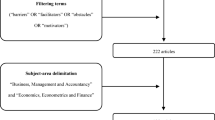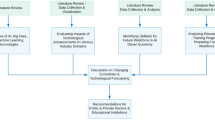Abstract
Australian science and technology academics see advantages in closer research links with industry but at the same time are aware of potential dangers. Academics in these areas with industry research funding tend to be older and more senior than those without such funding, and a higher proportion of them hold national competitive grants. These industry-funded academics tend to spend longer hours at work and more time on postgraduate teaching, administration, committee work and interaction with colleagues. They also have better publication records.
Similar content being viewed by others
References
ASTEC (1990). Setting Directions for Australian Research. Canberra: AGPS.
Australian Academy of Technological Sciences (1983). Developing High Technology Enterprises. Canberra: AGPS.
Australian Research Council (1993). Crossing Innovation Boundaries: The formation and maintenance of research links between industry and universities in Australia, Commissioned Report No. 26. Canberra: AGPS, 2 vols.
Australian Research Council (ARC) (1996). Patterns of Research Activity in Australian Universities, Commissioned Report No. 47. Canberra: AGPS.
Block, R. (1991) (Chairman). Bringing the Market to Bear on Research. Report of the Task Force on the Commercialisation of Research. Canberra: AGPS.
Blumenthal, D., Gluck, M., Louis, K.S. and Wise, D. (1986a). 'Industrial support of university research in biotechnology', Science231, 242-246.
Blumenthal, D., Gluck, M., Louis, K.S., Stoto, M.A. and Wise, D. (1986b). 'University-industry research relationships in biotechnology: Implications for the university', Science232, 1361-1366.
Blumenthal, D., Causino, N., Campbell, E. and Louis, K.S. (1996). 'Relationships between academic institutions and industry in the life sciences-An industry survey', New England Journal of Medicine, February, 368-373.
Blumenthal, D., Campbell, E., Anderson, M.S. and Louis, K.S. (1997). 'Withholding research results in academic life science: evidence from a national survey of faculty', Journal of the American Medical Association227 (15), 1224-1229.
Chaflin, S. (1988). 'Of Science and virtue: University research and technology transfer', Change20, 45-47.
Chaseling, C. (1989). 'Innovation and the commercialization of intellectual property,' Parts I and II, Directions in Government3.
Commonwealth of Australia (1995). Changing Research Culture Australia 1995, Report of the CRC Program Evaluation Steering Committee July 1995 ('Myers Report'). Canberra: AGPS.
Curry, J. and Kenny, M. (1990). 'Land grant university-industry relationships in biotechnology: A comparison with non-grant universities', Rural Sociology55(1), 44-57.
Dickson, S. (1984). The New Policies of Science. New York: Basic Books.
Etzkowitz, H. and Peters, L. (1991). 'Profiting from knowledge: Organisational innovations and the evolution of academic norms', MinervaXXIX, 133-166.
Etzkowitz, H. (1996). 'Conflicts of interest and commitment in academic science in the United States', Minerva34, 259-277.
Fairweather, J.S. (1989). 'Academic research and instruction: The industrial connection', Journal of Higher Education60(4), 388-407.
Feller, I. (1990). 'Universities as engines of R & D based on economic growth: They think they can', Research Policy19, 335-348.
Gibbons, M., Limoges, C., Nowotny, H., Swartzman, S. Scott, P. and Trow, M. (1994). The New Production of Knowledge: The Dynamics of Science and Research in Contemporary Societies. London: Sage.
Halsey, A.H. and Trow, M. (1974). The British Academics. London: Faber.
Kenney, M. (1986). Biotechnology: The University Industrial Complex. New Haven: Yale University Press.
Lee, Y.S. (1996). 'Technology transfer and the research university: A search for the boundaries of university-industry collaboration', Research Policy25, 843-863.
Leslie, L.L. and Harrold, R.I. (1993). 'Commercialization of scholarship in Australian universities', Prometheus11(1), 95-107.
Liyanage, S. and Mitchell, H. (1992). 'Changing patterns of research direction in higher education institutions: Evidence from Australian universities', The Australian Universities Review35(2): 36-42.
Louis, K.S., Blumenthal, D., Gluck, M.E. and Stoto, M.A. (1989). 'Entrepreneurs in academic: An exploration of behaviors among life scientists', Administrative Science Quarterly34(1), 110-131.
Peters, L. and Etzkowitz, H. (1990). 'University-industry connections and academic values', Technology in Society12, 427-440.
Richter, M.N. (1986). 'University scientists as entrepreneurs', Social Science and Public Policy, July, August.
Slatyer, R.O. (1994), 'Cooperative research centres: The concept and its implementation', Higher Education28, 147-158.
Slaughter, S. and Rhoades, G. (1990). 'Renorming the social relations of academic science: Technology transfer', Educational Policy4, 341-361.
Slaughter, S. and Leslie, L.L. (1997). Academic Capitalism: Politics, Policies, and the Entrepreneurial University. Baltimore: The John Hopkins Press.
Tegart, G. (1996). 'The cooperative research centres programme', Industry & Higher Education, June.
Turpin, T. and Hill, S. (1995). “Researchers, cultural boundaries and organisational change”, in Simpson, R. and Simpson, I. (eds.), Research in the Sociology of Work, Vol 5: The Meaning of Work. JAI Press.
Turpin, T. et al. (1996), Knowledge Based Cooperation: University-industry Linkages in Australia. Canberra: Commonwealth of Australia.
Webster (1994). 'University-corporate ties and the construction of research agendas', Sociology28(1), 123-141.
Author information
Authors and Affiliations
Rights and permissions
About this article
Cite this article
Harman, G. Australian science and technology academics and university-industry research links. Higher Education 38, 83–103 (1999). https://doi.org/10.1023/A:1003711931665
Issue Date:
DOI: https://doi.org/10.1023/A:1003711931665




